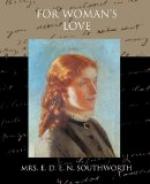“Clarence,” gravely replied Rothsay, “you ask me no questions, yet now I feel that you are entitled to some explanation of my strange flight and long sequestration. And I will give it to you to-morrow.”
“My dear Rothsay, I have divined much of the mystery, but you may tell me what you like, when you like. And now supper is ready,” said Clarence, heartily, as the four servants came up, each with a dish to set on the cloth, quite an unnecessary pageantry where one would have been enough, but that they all wanted to see the long-lost man. And with the warmth and freedom of their race they quickly set down their dishes and gathered around the stranger to give him a warm welcome, expressing loudly their surprise and delight in seeing him.
“Dough ‘deed I doane wonner at nuffin’ wot turns up in dis yere new country!” old Martha declared.
Then followed a gay and happy al fresco supper.
By the time it was over the sun had set, and the autumn evening air, even in that southern clime, was growing very chilly.
So the three friends arose from the table.
Rothsay and Corona turned to go up the hill. Clarence escorted them, carrying Corona’s bag.
They parted at the door of the log cabin.
“I shall have our tent pitched at the foot of the mountain early to-morrow morning, and breakfast prepared. You will come down and join me,” said Mr. Clarence, as he bade the reunited pair good night.
The wagon camp did not break up the next day, nor the day after that.
On the third day who should arrive but Lieut. Haught, absent on leave, and come to look up his relations. His meeting with them was a jubilee. His sister wept for joy; his brother-in-law and his uncle would have embraced him if they had expressed their emotions as continental Europeans do; even the negroes almost hugged and kissed him.
On Lieut. Haught’s representations and at his persuasions the little camp broke up, and with Rothsay and Cora in company, marched off to Fort Farthermost, where they were cordially received by the commandant and the officers, and where the reunited pair commenced life anew.
My story opened with the marriage and mysterious separation of the newly married pair. It should close with their reunion.
The later life of my young hero belongs to history. It would require a pen more powerful than mine to pursue his career, which was as grand, heroic and romantic as that of any knight, prince, or paladin in the days of old.
His pure name and fame became identified with the rise and progress of a great State in that Southwestern wilderness. Soldier, statesman, patriot, benefactor, all in one, his memory will be honored as long as his country shall last. And yet, perhaps, the crowning glory of his character was his power of self-renunciation—proved in every act of his public life, but shown first, perhaps, when, to leave the life of one beloved woman free, he renounced not only the hand of his adored bride, but




